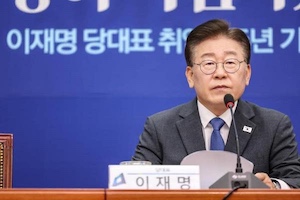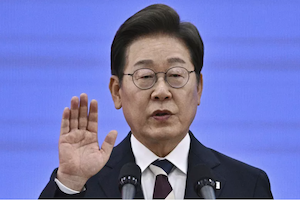World
Russia Launches Large-Scale Airstrikes on Ukraine; Power Outages Hit 45,000 Households in Kyiv

Russia recently (on the 12th) carried out its second large-scale drone and missile assault on Ukraine, once again targeting the power grid. The attacks intensified strikes on energy and other critical infrastructure amid harsh winter conditions. As Moscow’s invasion of its neighbor approaches its fourth year, the move appears to openly disregard U.S.-led efforts toward peace.
Ukrainian President Volodymyr Zelenskyy said Russian forces launched nearly 300 drones, 18 ballistic missiles, and seven cruise missiles at eight regions overnight. Russia also used a new hypersonic missile for the second time in the war, striking western Ukraine—apparently sending a “no backing down” warning to NATO. One wave of attacks killed four people at a postal warehouse facility in Kharkiv Oblast in the northeast, while hundreds of thousands of households in Kyiv Oblast were left without electricity.
Water utility pumping stations have switched to generator power, and water supply continues, though pressure issues may occur. The full extent of the damage remains unclear, and Russia has not responded to the incident. Throughout the four-year war, Russia has repeatedly targeted energy infrastructure, disrupting heating and water supplies for Ukrainian civilians in an apparent attempt to wear down public morale. Ukrainian officials have described this strategy as “weaponizing winter,” with civilians far from the front lines suffering collateral harm.
The central Ukrainian city of Kryvyi Rih has also been repeatedly attacked, resulting in civilian deaths and damage to homes and industrial facilities. The city is a major steel and mining hub and the hometown of President Zelenskyy. Located not far from the southern front line, Kryvyi Rih’s factories, logistics networks, and workforce are vital to Ukraine’s economy and serve as a key rear support center for the war effort. The head of the local military administration, Oleksandr Vilkul, urged residents to remain vigilant, store water, and charge electronic devices as much as possible, warning that difficult times lie ahead.
Since Russia’s full-scale invasion of Ukraine, it has repeatedly struck power plants, substations, and transmission lines with missiles and drones, aiming to cripple electricity and heating systems and disrupt industrial operations. These attacks have forced rolling blackouts and emergency power rationing across Ukrainian cities, while repair crews work under fire to restore services. Ukraine has had to rely on air defense systems and imported electricity to stabilize its power grid.
According to data from the UN Human Rights Monitoring Mission in Ukraine, intensified Russian airstrikes behind the front lines have made 2025 the deadliest year for Ukrainian civilians since Russia’s invasion began in 2022.
The United States has also accused Russia of carrying out “dangerous and unjustified escalation” while the Trump administration is pushing for peace talks. At an emergency UN Security Council meeting, U.S. Deputy Permanent Representative Tammy Bruce said the White House deeply regrets the “staggering number of casualties” in the conflict and condemned Russia for targeting energy systems and escalating attacks on Ukraine’s energy and other critical infrastructure.
- 18 reads
Death of Female Volunteer Sparks Nationwide Protests in the U.S.

A recent incident in Minnesota in which a U.S. Immigration and Customs Enforcement (ICE) officer shot and killed volunteer Renee Good has ignited demonstrations in major cities across the United States. On January 11, Secretary of Homeland Security Kristi Noem announced that **“hundreds” of additional federal personnel** would be deployed to Minneapolis to ensure frontline law-enforcement safety and support ongoing operations.
On January 7, 37-year-old Renee Good, who had long volunteered documenting ICE activities, was shot and killed during a confrontation. Federal authorities claimed Good attempted to use her vehicle as a weapon against officers, forcing the agent to act in self-defense. However, Minneapolis Mayor Jacob Frey wrote in The New York Times that video evidence shows Good was turning her vehicle away from, not toward, officers at the time of the shooting — contradicting the federal account. Frey criticized the federal government for spreading misleading information and attempting to “demonize” the victim.
Protests have spread across the country, including in cities such as Los Angeles and New York, with hundreds of demonstrations reported nationwide over the weekend. Federal authorities have maintained a firm stance, emphasizing that any violence against government operations or law-enforcement officers is a crime and will be prosecuted.
In the Minneapolis–St. Paul area, about 2,000 federal agents are now stationed, marking one of the largest deployments in Department of Homeland Security (DHS) history. Noem stressed that enforcement actions will not be halted due to protests and criticized local governments for failing to maintain public order.
Tricia McLaughlin, Assistant Secretary at DHS, also stated firmly that enforcement operations will continue despite the protests and that local officials have not done enough to uphold security.
As video of the shooting continues to circulate widely online, demonstrations remain intense. The federal government is investigating the case, but no decision has been made yet on whether additional evidence will be released publicly.
- Read more
- 29 reads
Museveni Poised for Re-election in Uganda as Voters Fear Repeat of 2021 Crackdown

Uganda, an East African nation, will hold a presidential election on the 15th. President Yoweri Museveni, 81, who has been in power since 1986, is almost certain to extend his nearly four-decade rule. His main challenger is 43-year-old opposition leader Bobi Wine, whose real name is Robert Kyagulanyi, running for president for the second time. A former popular singer, Bobi Wine’s last bid in 2021 ended in bloodshed and disappointment.
Despite widespread expectations that Museveni will win re-election, human rights groups and international observers have accused authorities of arrests, abductions, and media intimidation ahead of the vote. Bobi Wine has been repeatedly detained during the campaign and has even appeared at rallies wearing a bulletproof vest, describing the election as having turned into “a war.” Speaking at a rally of his National Unity Platform (NUP) party, he said: “They cannot abduct all of us. The prisons are already full, and there are still millions of Ugandans who want change.”
Many citizens, however, fear a repeat of the violent crackdown seen in 2021. Winnie Promise Nantume, a resident of the capital, said that election left “people losing their lives and their belongings, and that makes us very afraid.” Concerns about democratic backsliding in the region also persist. Violence and allegations of fraud marred Tanzania’s election last year, with security forces killing hundreds of protesters, while a series of protests in Kenya since 2024 have left dozens of demonstrators dead, with perpetrators going unpunished.
- 46 reads
U.S. Military Launches Large-Scale Airstrikes in Syria, Targeting ISIS Positions

U.S. Central Command (CENTCOM) said recently that it has carried out multiple “large-scale” airstrikes against the militant group Islamic State (IS) in Syria, describing the operations as a “direct response” to an attack on U.S. and Syrian forces near Palmyra on December 13. That attack killed two U.S. service members and one civilian interpreter.
In recent months, the U.S.-led coalition has continued to conduct airstrikes and ground operations against suspected IS militants inside Syria, with Syrian security forces also taking part. In a statement, CENTCOM said the operations are intended to counter terrorism and protect U.S. and partner forces in the region, warning that anyone who harms American personnel will be found and eliminated, regardless of where they attempt to hide or how they seek to evade justice.
CENTCOM said the strikes were carried out early Saturday afternoon U.S. Eastern Time as part of “Operation Hawkeye Strike.” The statement did not specify whether there were any casualties from the attacks.
Syria has maintained cooperation with the U.S.-led coalition fighting the Islamic State. Approximately 1,000 U.S. troops remain stationed in Syria. Late last year, Syrian President Ahmed al-Sharaa visited the White House, where the two sides reached agreements on related cooperation.
- 38 reads
Following His Visit to China, Lee Jae-myung to Visit Japan on the 13th to Meet Takaichi; Japan–South Korea–China Relations in the Spotlight

The governments of Japan and South Korea announced simultaneously on the 9th that South Korean President Lee Jae-myung will travel to Nara Prefecture, the hometown of Japanese Prime Minister Sanae Takaichi, from the 13th to the 14th for a two-day official visit, during which talks will be held in Japan. This trip is part of the regular reciprocal “shuttle diplomacy” between Japanese and South Korean leaders, aimed at continuing the improvement of bilateral relations in recent years and strengthening coordination amid a complex regional security environment.
The Blue House stated that the talks are expected to cover regional and international issues, as well as ways to enhance cooperation in areas directly related to people’s livelihoods, including the economy, society, and culture. The South Korean side hopes that the meeting will create opportunities for humanitarian cooperation on historical issues between the two countries, and discussions may also include China’s export control measures affecting Japan. How Lee Jae-myung, who has just concluded a visit to China, will manage relations among South Korea, China, and Japan has become a focus of public attention.
Against the backdrop of continued pressure from China, the Takaichi cabinet has launched this year’s “Takaichi diplomacy.” In addition to President Lee Jae-myung of South Korea and Italian Prime Minister Giorgia Meloni visiting Japan next week, Defense Minister Shinjiro Koizumi and Finance Minister Satsuki Kataoka are scheduled to visit the United States, while Foreign Minister Toshimitsu Motegi will travel to the Middle East. Amid deteriorating Japan–China relations and adjustments in U.S. diplomatic priorities, Japan is strengthening cooperation with like-minded countries through intensive diplomacy to enhance its international presence.
- 72 reads
Helping Young Families Achieve Homeownership Dreams: Trump Plans to Ban Wall Street Investment Firms from Hoarding Homes
 Media reports say that U.S. President Donald Trump on the 7th plans to roll out another new housing policy. He told the media that he would ban large institutional investors from purchasing additional single-family homes and urged Congress to legislate on the matter. Media analysis suggests this move is an opening step by the Trump administration to address the U.S. housing crisis, with the aim of helping young families realize their dreams of homeownership.
Media reports say that U.S. President Donald Trump on the 7th plans to roll out another new housing policy. He told the media that he would ban large institutional investors from purchasing additional single-family homes and urged Congress to legislate on the matter. Media analysis suggests this move is an opening step by the Trump administration to address the U.S. housing crisis, with the aim of helping young families realize their dreams of homeownership.
According to the reports, since the 2008 financial crisis, tens of thousands of single-family homes in the United States have gone into foreclosure. Wall Street investment firms took advantage of the situation by buying these properties and renting them out. At the peak in 2022, investors purchased as much as one-quarter of all single-family homes on the market, a factor widely seen as exacerbating the tightening of housing supply. Housing rights advocates point out that institutional investors often bid with all-cash offers, making it difficult for first-time buyers to compete, further reducing the number of homes available for sale and driving up local housing prices.
The reports also note that Trump’s proposed measure would not only impact real estate investments by private equity funds but also place greater pressure on homebuilders, signaling that the government is actively responding to public concerns over high housing costs. If implemented, the policy would introduce new uncertainties for builders and the broader housing market. However, some media analysts argue that on a national level, these investment firms own only about 3% of residential housing, so the overall impact on the U.S. housing market is likely to be limited.
- 71 reads
Snowstorm Sweeps Across Europe: Netherlands Cancels 600 Flights, Transportation Paralyzed; 5 Dead in France

Recently, severe snowstorms and intense cold weather have swept across multiple countries in Europe, causing significant disasters. Airports in the Netherlands have already canceled over 400 flights, with an expected 600 more flights also being forced to cease operations. Both road and rail transportation have been severely affected, leaving thousands stranded at airports. France has also been hit by snowstorms, leading to multiple traffic accidents and at least five fatalities.
France continues to be enveloped in frigid weather, with snowfall in the Paris region and across the country, followed by freezing night temperatures. Six small airports in the west and north have been closed due to icy conditions. In the southwest department of Landes, two accidents resulted in three deaths due to icy roads. In the Paris region, two individuals also lost their lives—one in a collision with a heavy truck, and the other when a taxi skidded on the snow and fell into the Marne River. Bus services in Paris were suspended but have gradually resumed, although the situation remains chaotic.
To clear snow from the runways, Charles de Gaulle Airport announced that 40% of flights would be canceled on the morning of the 7th. Orly Airport is also planning to cancel one-quarter of flights during the same period. The meteorological department has warned that the severe weather is expected to continue until the 7th. Landmark sites in France, such as the Eiffel Tower and the Palace of Versailles, have been covered in heavy snow.
French Transport Minister Philippe Tabarot stated that snow is expected again on the evening of the 6th through the 7th and urged the public to avoid driving if possible. The French meteorological department has issued an orange alert for 38 administrative regions, and multiple railway lines have announced suspensions.
The Netherlands has also been continuously affected by snowstorms, with streets blanketed in snow. Amsterdam, being one of the major transit hubs in Europe, has seen transportation paralyzed for five consecutive days due to the stormy conditions and low temperatures. Schiphol Airport is facing the worst situation, having canceled over 400 flights on the 7th, with another 600 flights expected to be grounded. A large number of passengers are stranded at Amsterdam Airport, unable to transfer to subsequent flights. KLM Royal Dutch Airlines has warned that, due to extreme weather and supply delays, de-icing fluid is nearly exhausted.
This morning, temperatures in southern and eastern Germany fell below minus 10 degrees Celsius, with many areas covered in snow, including regions close to the North Sea. Meteorologists predict a wave of storms will hit on the 9th, potentially bringing heavy snowfall to the north and east.
The United Kingdom has also experienced its coldest temperatures since winter began, with some areas receiving up to 15 centimeters of snow. The meteorological unit estimates that a new wave of storms is imminent. The UK Met Office has issued snow and ice warnings for areas including Scotland and Northern Ireland, warning that the next storm is expected to bring strong winds and snow starting on the 8th local time.
- 55 reads
Fighting Childhood Obesity: UK Introduces Ban on Junk Food Advertising

To curb the increasingly severe problem of childhood obesity, the UK government has described this policy as a “world-leading health initiative” and announced that it will implement the strictest food advertising restrictions in the world starting January 5. The new measures aim to significantly reduce young people’s exposure to advertisements for foods high in fat, sugar, and salt (HFSS), creating a healthier food environment for children and seeking to correct dietary habits at their source.
Under the new rules, UK television channels will face advertising time restrictions, with a complete ban on unhealthy food advertisements before 9:00 p.m., during peak viewing hours. On digital platforms such as YouTube, Facebook, and Instagram, the policy goes even further, introducing a “24-hour ban” on all paid junk food advertising. As early as the end of 2024, the UK had already imposed higher sugar taxes on sugary drinks, milkshakes, and sweetened yogurts, gradually establishing a stringent nutrition management system.
In addition, local governments are authorized to restrict fast-food outlets from opening or operating near schools. Government officials note that nearly one-third of school-age children in the UK are currently overweight, a situation that not only harms public health but also places a heavy financial burden on the healthcare system.
Although the food and advertising industries have expressed concerns about potential economic impacts, the medical community and public interest groups have widely praised the policy. They argue that children are highly susceptible to the influence of attractive advertising, which can trigger impulsive consumption, and view the legislation as a major milestone in protecting the health of future generations. The UK’s move has attracted international attention, and its effectiveness is expected to serve as an important reference for other countries when shaping health policies.
- 62 reads
Trump Vows to Take Over Greenland as Denmark Urges an End to Threats

A recent U.S. military raid on Venezuela that reportedly led to the capture of President Nicolás Maduro has sent shockwaves around the world. In the aftermath, U.S. President Donald Trump once again reiterated that Greenland should be incorporated into U.S. territory. Danish Prime Minister Mette Frederiksen issued a stern warning that any U.S. attempt to annex Greenland by force would amount to the collapse of NATO. Greenland’s Prime Minister, Múte Bourup Egede, also responded, saying Trump’s remarks were disrespectful to Greenland and stressing that the island is not a commodity for sale.
In an interview with The Atlantic, Trump again claimed that “the United States needs Greenland.” Concerns were further heightened after the wife of one of Trump’s aides posted an image on social media showing the U.S. flag draped over Greenland. In a statement, Denmark’s prime minister described such rhetoric as “utterly absurd” and urged the United States to stop threatening its allies and other peoples. Greenlandic officials added that comparing Greenland to U.S. military intervention in Venezuela was completely wrong and unacceptable.
Leaders in both Denmark and Greenland have called for calm and unity, emphasizing that Greenland cannot simply be conquered. Trump, however, told reporters aboard Air Force One that from a national security perspective, the United States needs Greenland, and hinted that the issue would be revisited in the coming months. His remarks have intensified fears that Washington may take action regarding Greenland in the near future, potentially dealing a further blow to NATO and the European security order.
- 58 reads
Lee Jae-myung Arrives in Beijing for Four-Day Visit, Meets Xi Jinping for Second Time in Two Months

South Korean President Lee Jae-myung arrived in Beijing on the 4th to begin a four-day visit to China, marking the first visit by a South Korean president since 2019. On the 5th, Lee is scheduled to meet Chinese President Xi Jinping, attend a business forum, and hold talks with Premier Li Qiang, before traveling to Shanghai on the 6th.
More than 200 leading South Korean business figures are accompanying the delegation, including Samsung Electronics Chairman Lee Jae-yong, SK Group Chairman Chey Tae-won, and Hyundai Motor Group Chairman Chung Eui-sun. Discussions are expected to cover supply chain investment, the digital economy, and cultural exchanges.
According to reports, the Lee–Xi meeting will focus on trade, economic cooperation, and security issues, with Seoul hoping Beijing will play a stabilizing role amid rising regional tensions. Analysts note that recent U.S. military action against Venezuela, North Korea’s renewed missile tests, and heightened China–Japan friction over a potential Taiwan contingency have made the geopolitical environment more sensitive. This will be the second meeting between Lee and Xi within two months, signaling Beijing’s intent to strengthen economic cooperation and tourism exchanges with South Korea.
The trip is also Lee’s first visit to China since taking office in June last year, coinciding with a period of heightened global tensions after U.S. President Donald Trump confirmed U.S. strikes on Venezuela and North Korea launched multiple ballistic missiles on the 4th. Analysts suggest that amid strained China–Japan relations, Beijing may be more inclined to deepen engagement with Seoul to keep supply chains running smoothly.
Markets are closely watching three key issues from the Xi–Lee talks: whether South Korea will propose concrete measures to narrow its trade deficit with China, how both sides will manage sensitive issues such as North Korea and Taiwan, and Washington’s response. Whether Beijing will ease restrictions on South Korean content and tourism has also drawn attention, as Seoul adopts a more cautious diplomatic strategy while balancing its ties with the United States and Japan.
- 68 reads
Human Rights
Fostering a More Humane World: The 28th Eurasian Economic Summi

Conscience, Hope, and Action: Keys to Global Peace and Sustainability

Ringing FOWPAL’s Peace Bell for the World:Nobel Peace Prize Laureates’ Visions and Actions

Protecting the World’s Cultural Diversity for a Sustainable Future

Puppet Show I International Friendship Day 2020

